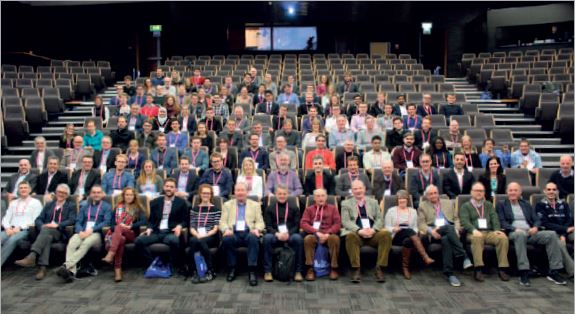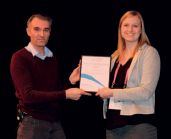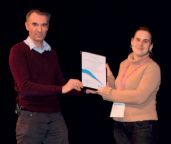
Physiology News Magazine
Meeting Notes: Biomedical Basis of Elite Performance 2016
6–8 March 2016, East Midlands Conference Centre, Nottingham, UK
Events
Meeting Notes: Biomedical Basis of Elite Performance 2016
6–8 March 2016, East Midlands Conference Centre, Nottingham, UK
Events
Paul Greenhaff
Chair, Scientific Programme Committee (BBEP 2012, BBEP 2016), University of Nottingham, UK
Lauren Skelly
McMaster University, Canada
Fiona Lewis
King’s College London, UK
https://doi.org/10.36866/pn.103.18
Paul Greenhaff, Chair, Scientific Programme Committee (BBEP 2012, BBEP 2016), University of Nottingham, UK
Four years on from the Biomedical Basis of Elite Performance (BBEP) 2012, I was always nervous about how BBEP 2016 would stand up in comparison to the highly successful meeting linked to the London Olympics.

From the outset, however, the signs were at all times positive. Experienced and respected colleagues in the field of human and exercise physiology who made up the Scientific Programme Committee were at all times willing and helpful in suggesting potential high quality speakers and fashioning a world-class scientific programme.
I am very grateful for their contribution as it was the catalyst to success for BBEP 2016. A clear mark of their insight and the scientific esteem of The Society was that with the exception of one individual, every potential speaker The Society approached from across the world, accepted the offer to attend. Furthermore, the majority of the invited speakers actively contributed to the whole three days of the meeting.
Building on BBEP 2012, the 2016 meeting undeniably retained a family feel, which was underpinned by the very welcoming and professional staff of The Society and Ken O’Halloran, The Society’s Meetings Secretary. The collegial nature of the meeting was also helped by the close proximity of the conference hotel and the meeting venue, which meant debate and socializing beyond the conference, could continue well into the night.
I am grateful to the exhibition sponsors for their support of the meeting and to the National Centre for Sport and Exercise Medicine – East Midlands who kindly sponsored the Early Investigator Competition to the tune of £1000 for the best oral communication and £1000 for the best poster presentation. Both competitions were of a very high quality and highly competitive – congratulations to Lauren Skelly, McMaster University, Canada and Fiona Lewis, King’s College London, UK.
Finally, I’d like personally to thank the speakers who willingly gave their time and insight, the 270 individuals who registered and attended the meeting and the many thousands of people who watched the presentations online and delivered very positive comments via social media (special thanks go to the AV technical support).
Collectively we delivered a successful event and have now created a flourishing BBEP brand. Onwards and upwards to BBEP 2020!
Report by the winner of the Early Career Investigator Award for Best Oral Communication
Lauren Skelly, McMaster University, Canada
In March, I had the pleasure of travelling from McMaster University in Canada to Nottingham to attend the Biomedical Basis of Elite Performance (BBEP) 2016 Conference. It was my first international meeting and my first trip to the UK.
Over three days, I had the opportunity to interact with and learn from many world-renowned exercise physiologists. The East Midlands Conference Centre provided an outstanding venue, and the small size of the meeting created a warm and collegial atmosphere, which made for a fantastic conference experience. I thoroughly enjoyed attending the symposia presentations that highlighted recent developments in the field, ranging from rodent to elite athlete investigations. I also gained a new appreciation for the history of exercise performance and nutrition in exercise metabolism owing to the outstanding plenary lectures.

I presented research findings from my doctoral work related to sex-based differences in the metabolic and physiologic responses to interval exercise. The oral communication was delivered to the largest audience in my career and was a tremendous platform for me to share my work. I was honoured to receive the Early Career Investigator Award for best Oral Communication in the company of such excellent oral presenters. I am grateful for the support of the National Centre for Sport and Exercise Medicine.
The high quality of the symposia and graduate student oral and poster presentations is a reflection of the passion, continued interest and importance of exercise physiology throughout the world. Thank you to the Physiological Society and the University of Nottingham for hosting BBEP 2016. The experience was a highlight of my graduate career, and I am thankful for the many welcoming and meaningful conversations with the other attendees and for the travel support from the Physiological Society. I look forward to attending future meetings, including BBEP 2020!
Report by the winner of the Early Career Investigator Award for Best Poster Communication
Fiona Lewis, King’s College London, UK
I am a post-doctoral researcher at the Centre of Human and Aerospace Physiological Sciences, Kings’ College London investigating the effect of ageing on the regenerative potential of cardiac stem/progenitor cells within Georgina Ellison-Hughes’s lab.
My research to date has focused on understanding the biology of different sources of stem/progenitor cells, including skeletal muscle progenitors. When I joined King’s in 2013 the opportunity arose to collaborate with a fellow researcher, Dr. Agley investigating the role of GSK3 and b-catenin in the differentiation of human myogenic cells.

The Biomedical Basis of Elite Performance 2016 meeting in Nottingham provided an excellent forum to present these findings to experts in the field. The conference itself had an energetic atmosphere with a series of informative talks and plenty of opportunities to network and discuss the exciting research being presented. When it came to presenting my poster, I felt that I successfully highlighted the key findings and their significance, and as a result, I received a lot of positive feedback and insightful discussion. I found this opportunity to receive feedback from peers in a friendly, supportive environment invaluable as we are currently preparing this research for publication and this provided a thought provoking insight.
I would highly recommend this meeting and encourage fellow researchers to attend and enter the poster communication and oral competitions. I would especially like to thank the conference organisers for providing a stimulating environment, the National Centre for Sports and Exercise Medicine for sponsoring this prize and lastly my colleagues and collaborators for their continued support.
About the National Centre for Sports and Exercise Medicine
The National Centre for Sport and Exercise Medicine (NCSEM) is a partnership with founding members in the East Midlands, London and Sheffield. It was established with a £30m grant from the Department of Health as an Olympic Legacy project to deliver education, research and clinical services in sport, exercise and physical activity, that can be translated into improved health outcomes for the nation. http://www.ncsem-em.org.uk
